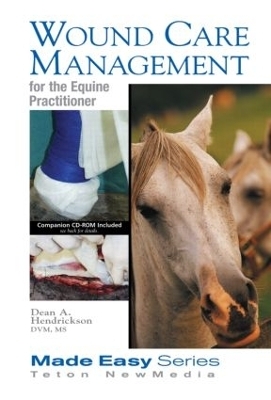
Wound Care Management for the Equine Practitioner
Teton NewMedia (Verlag)
978-1-59161-021-2 (ISBN)
Dean A. Hendrickson
Contents
Section 1 Wound Care Dressings
Introduction 3
Some Helpful Hints 3
Dressings used for Cleaning and Prepping 4
Dressings Used for Debridement 6
Dressings Used for Packing 7
Dressings Used for Absorption 9
Dressings Used for Compression 11
Dressings Used for Support 12
Dressings Used for Protection 13
Dressings Used for Moisture 14
Methods of Dressing Application 14
Splint Application 16
Emergency Transport 19
Section 2 Wound Preparation, Cleaning, and Debridement
Wound Preparation 26
Wound Infection 28
Wound Cleaning Agents 29
Scrubbing 30
Lavage 31
Saline 32
Antiseptic Agents 32
Povidone Iodine 34
Chlorhexidine 35
Hydrogen Peroxide 36
Acetic Acid (Vinegar) 36
Dakin’s Solution 37
Topical Antibiotics 38
Silver 38
Nitrofurazone 39
Triple Antibiotic 39
Surfactant Based Agents 40
Wound Debridement 41
Mechanical Methods 41
Sharp Debridement 42
Physical Debridement 43
Chemical Debridement 44
Chemicals 44
Hypertonic Saline Dressings 44
Natural Methods 45
Autolytic Debridement 45
Enzymatic Debridement 46
Section 3 Wound Exploration
Head Wounds 52
Neck and Back Wounds 54
Chest Wounds 55
Abdominal Wounds 57
Leg Wounds 58
Important Anatomical Considerations 60
Foreign Body Detection 64
Exploration 64
Ultrasound 65
Plain Radiology 66
Contrast Radiography 67
Computed Tomography and Magnetic
Resonance Imaging 67
Section 4 Primary Wound Closure
Appropriate Wounds for Primary Closure 70
Closure Techniques for Primary Wound Closure 73
Suture Closure 74
Needle Type 74
Absorbable versus Non-Absorbable 75
Monofilament versus Multifilament 76
Suture Patterns 77
Appositional 77
Simple Interrupted 77
Simple Continuous 78
Interlocking 79
Intradermal 80
Tension Relieving 80
Cruciate 81
Near-Far-Far-Near 81
Vertical Mattress 82
Horizontal Mattress 82
Knot Types 83
Staple Closure 83
Suture/Staple Removal 84
Tissue Adhesive Closure 85
Other Tension Relieving Techniques 85
Wound Protection and Immobilization 87
Section 5 Delayed Primary Wound Closure
Appropriate Wounds 92
Intermediate Wound Care 92
Preparation for Closure 93
Section 6 Second Intention Wound Healing
Moist Wound Healing Concepts 100
Dressing Choices 103
Hypertonic Saline Dressings 105
Antimicrobial Dressings 111
Hydragel Dressings 115
Calcium Alginate Dressings 117
Topical Dressings: Collagens, Maltodextrans 122
Replacement Tissue Dressings 124
Growth Factors 125
Semi-Occlusive Dressings 126
Steroids 131
Summary 132
Caustic Agents 134
Excess Granulation Tissue 134
Non-Healing Wounds 136
Section 7 Skin Grafting
Immediate Wound Care 140
Bed Preparation 141
Types of Grafts 142
Healing Stages of Grafts 142
Skin Graft Types 143
Grafting Techniques 144
Skin Graft Donor Sites 145
Animal Positioning, Anesthesia, and Sedation 146
Pinch Grafting 147
Punch Grafting 151
Tunnel Grafting 154
Mesh Grafting 155
Pedicle Grafting 158
Grafting Aftercare 158
Dressing Choices 158
Frequency of Dressing Changes 159
Wound Immobilization 159
Reasons for Graft Failure 161
Inappropriate Type of Graft 161
Inadequate Graft Preparation 161
Inadequate Recipient Bed Preparation 162
Infection 162
Separation of Graft from Wound Bed 162
Graft Movement 163
Section 8 Specific Wound Considerations
Heel Bulb Lacerations/Hoof Wall Avulsions 166
Lacerations of Synovial Structures 173
Tendon and/or Ligament Lacerations 178
Chest Lacerations 181
Abdominal Wall Lacerations 183
Head Lacerations 185
Lacerations to the Axillary Region 190
Index 193
Recommended Readings 208
| Reihe/Serie | Made Easy Series |
|---|---|
| Verlagsort | Jackson |
| Sprache | englisch |
| Maße | 146 x 215 mm |
| Gewicht | 446 g |
| Themenwelt | Sachbuch/Ratgeber ► Natur / Technik ► Tiere / Tierhaltung |
| Veterinärmedizin ► Allgemein ► Tiermedizinische Fachangestellte | |
| ISBN-10 | 1-59161-021-4 / 1591610214 |
| ISBN-13 | 978-1-59161-021-2 / 9781591610212 |
| Zustand | Neuware |
| Informationen gemäß Produktsicherheitsverordnung (GPSR) | |
| Haben Sie eine Frage zum Produkt? |
aus dem Bereich


